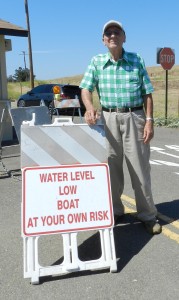
Dr. Vance Kennedy was visiting Modesto Reservoir in eastern Stanislaus County last week when someone asked him what the likelihood is that almond orchards around the reservoir are pumping water from the reservoir via seepage into nearby aquifers. “One-hundred percent,” replied Kennedy.
Kennedy retired from the U.S. Geological Survey (USGS) after winning its highest possible award. His special expertise is in tracing sediments in water, but he’s well versed in geology and hydrology in general, and stays current with USGS research.
His visit to Modesto Reservoir was a side trip; the chief motive for the excursion was to inspect newly-planted orchards on the steep sides of the foothills that are a dominant feature of land east of the reservoir.
Kennedy was appalled by what he saw. “If we get one of those ‘Pineapple Express’ storms out of the south this winter,” he said, “the erosion will be terrible. The sedimentation will clog rivers and streams and we’ll have an environmental disaster.”
For the last few years, Kennedy has been trying to convince state and local officials that planting groundwater-dependent orchards in Stanislaus County’s eastern foothills can only lead to depletion of a precious public resource and enduring environmental degradation. So far, he’s had no response.
Last Thursday, Kennedy attended a meeting in Knights Ferry where dozens of citizens voiced concerns about large farming operations that were lowering the water table and degrading quality of life in a once-idyllic region where people sought the peace and quiet of country life. Kennedy spoke briefly about erosion and sedimentation, but his chief points got lost amid a deluge of other problems.
“We feel like pawns in someone else’s chess game,” said moderator Gail Altieri prior to introducing a panel of guest speakers. The panel included Ryon Paton, of farming giant Trinitas Partners, Oakdale Irrigation District General Manager Steve Knell, and Stanislaus County Supervisor Bill O’Brien. None of the three was able to allay concerns about dropping water tables, dry wells, noise, dust and pesticide pollution, and disappearing wildlife.
But as dire as the problems posed by industrial farming in the foothills are, they are eclipsed by the runaway depletion of the last of the San Joaquin Valley’s groundwater reserves and the diversion of water from rivers, lakes, and reservoirs. It’s a reality no one wants to face, least of all local politicians. In fact, the default position of politicians throughout the San Joaquin Valley when confronted with water issues is to deflect attention to the state and federal governments, who are expected to require more water for fish and the Delta ecosystem.
“If the state increases flows drastically,” said Supervisor O’Brien last Thursday, “it will change life as we know it.”
O’Brien didn’t seem to realize that many people who attended the meeting had already had their lives changed. As he referred to the state taking “our water,” some people couldn’t help thinking that “their” water had already been taken, not by the state but by industrial pumps driven by an overseas demand for almonds.
Kennedy himself reflected on the ongoing massive diversion of water from Modesto Reservoir and from the Stanislaus and Tuolumne Rivers. With orchards surrounding the reservoir and nut trees alongside both rivers, the diversions of “our water” must be measured in the thousands of acre feet.
No one felt the need to address those issues, most likely because even local leaders are nothing more than “pawns in someone else’s chess game.” Pumping water from rivers, lakes, and reservoirs via the ruse of “overlying rights” has become a license to steal. Until environmental law somehow catches up with science, groundwater will continue to be measured by profit and loss statements until it’s gone―or at least until public citizens demand better accounting.
